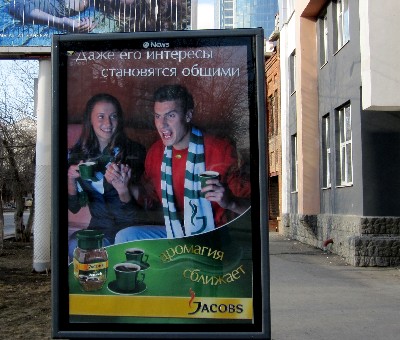The Instrumental Case Continued: «стать и становиться» Posted by josefina on Apr 9, 2010 in language
«Даже его интересы становятся общими» [Even his interests become common; shared].
It’s been almost two months since we last spoke here on the blog «о творительном падеже» [about the instrumental case]! «Невероятно!» [Unbelievable, incredible!] The last time was when we discussed the verb «быть» [to be] in the context of the difficult – not only grammatical but also philosophical – question «кем быть?» [who to be?]. That was – «о ужас!» [oh the horror!] – over two months ago now. That’s why I think it is high time «продолжить наш разговор» [pfv. to continue our conversation] about everybody’s favorite instrumental case! «А как?» [But how?] you ask. Maybe by having a look at yet another useful ‘verb couple’ which contains «два вида» [two aspects] of one and the same verb: «совершенный вид» [perfect] and «несовершенный вид» [imperfect]. And what better verb couple but «стать и становиться»? Right away I can see you all raising your eyebrows in concern and with the obvious question: “But how can a «возвратный глагол» [reflexive verb] like the imperfect aspect of «становиться» become a non-reflexive verb in the perfect aspect and transform into «стать»?” I have no answer to this question. I don’t know! All I know is that it can and that it does. So all I can say is: «Выучить надо» [One has to learn it]. The verb «стать и становиться» has more than one meaning (which Russian verb with a little bit of self-respect doesn’t?!): 1) to stand; 2) (with instrumental case) to become, get. The meaning which is interesting to us today is the second one because it demands to be followed by THE INSTRUMENTAL CASE.
Let’s have a look at a couple of examples of how this happens in sentences. Have you often wondered how to know when to use perfect and when to use imperfect in different sentences? I know I have! But if you haven’t then that’s okay. For those of you who have: this can be illustrated – somewhat anyway – by the phrase «стать/становиться друзьями» [to become friends]:
«Мы не стали друзьями» [We didn’t become friends (because a RESULT – though it was negative – was achieved you must use the PERFECT aspect)].
«Мы долго становились друзьями» [lit. We became friends a long while, but better yet: It took us a long time to become friends (here the important thing is the PROCESS of becoming friends, not so much the result, thus apply the IMPERFECT aspect)].
And how about pairing the verb «стать/становиться» with the noun «профессия» [profession] and create the curious combination «стать/становиться кем-нибудь» [to become somebody]?
«Уже во время учёбы наши студенты становятся хорошими специалистами» [Already during their studies our students become good specialists (in this sentence the words ‘our students’ mean students at this particular institution of higher education IN GENERAL, that this is repeated over and over again or is constantly happening – so you need the IMPERFECT aspect)].
«Петя стал хорошим специалистом только после пяти лет рабочего опыта» [Petya became a good specialist only after five years of work experience (you see in this sentence Petya has achieved a RESULT – even though a process of five years was needed first in order to attain it – so we get to use the PERFECT aspect this time. Yay for Petya!)].
«Маша мечтала стать балериной» [Masha dreamed of becoming a ballerina (Masha, of course, wanted not the ‘process’ of becoming a ballerina, but to actually have the result in her hands (and in her feet obviously) one day – thus with this verb we place the PERFECT aspect!)].
«Поэтами не становятся, поэтами рождаются!» [lit. ‘they’ don’t become poets – ‘they’re’ born poets!, but better to translate like this: ‘You can’t become a poet, you can only be born a poet’ (here is another GENERAL statement about reality demanding the IMPERFECT aspect)].
I don’t what the last sentence is about at all… I found it somewhere in the darker depths in my brain and decided to make use of it here today. For the sake of grammar! But if it is true? «Вряд ли» [Hardly; it is unlikely; I doubt it] because it seems to me that «вообще это похоже на бред» [generally it looks like delirium]. Delirium or no delirium, always remember to say proudly as it reads below:
«Соблюдаю падежные формы!» [I observe (respect; keep) declensional forms!]

Build vocabulary, practice pronunciation, and more with Transparent Language Online. Available anytime, anywhere, on any device.






Comments:
Ed:
Josefina,
Just a quick thank you for writing this article. I have recently been learning more about verbal aspect AND the instrumental case. So this was very timely and very well written. I especially liked the way you explained the aspect in each of the examples. Truly helpful!
Ed in St. Louis
saint facetious:
I’ve found that it’s sometimes best to think of imperfect verbs as being in the progressive tenses in English and perfect verbs in the simple tenses. That usually makes for a good understanding of the verb for native English speakers, though Russian isn’t quite as detailed in regarding to time.